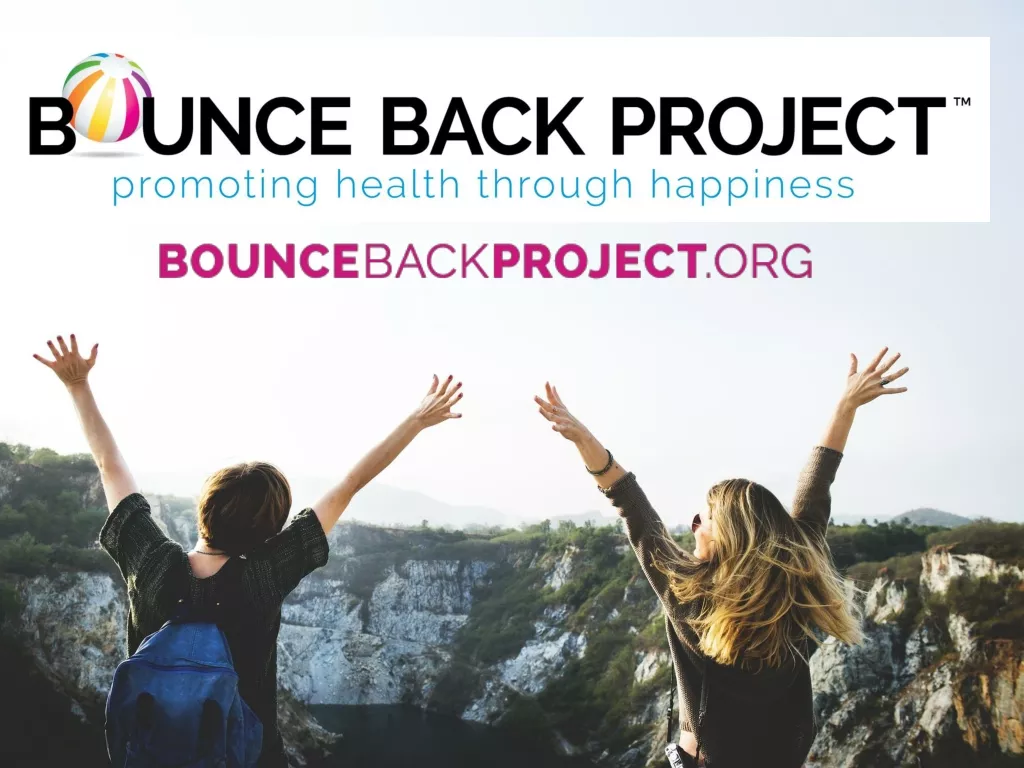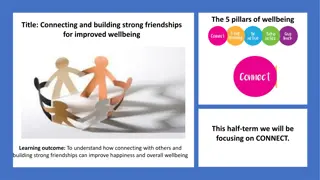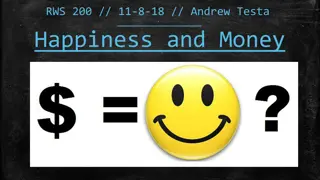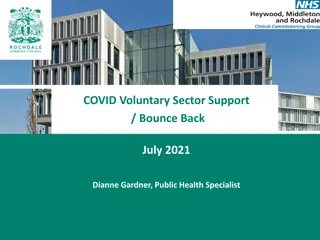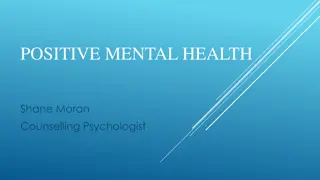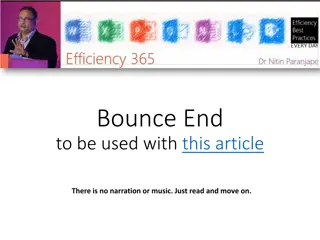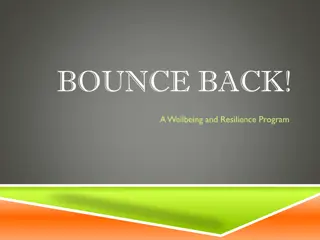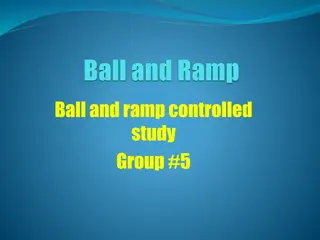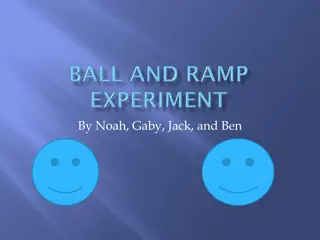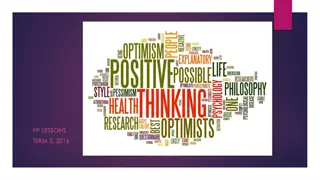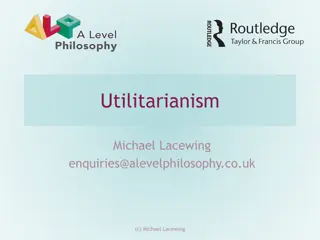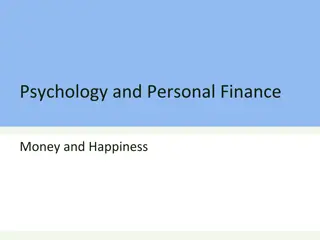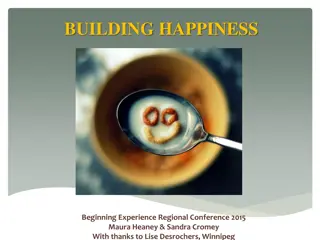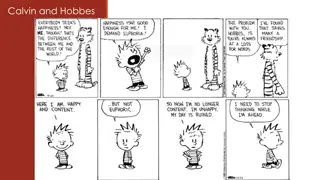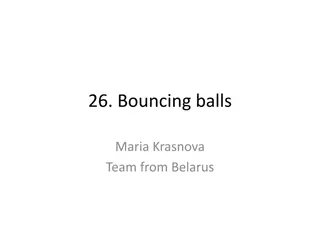Bounce Back Project: Promoting Health Through Happiness
The Bounce Back Project is a unique collaborative effort involving physicians, nurses, healthcare leaders, and community members with a single purpose to impact individuals, communities, and organizations by promoting health through happiness. The project aims to expand resilience by retraining minds to focus on the positive, increase well-being, and reduce feelings of depression through tools like random acts of kindness, gratitude, social connections, mindfulness, and self-care practices. Mindfulness, a key component, helps individuals live in the present moment, fostering benefits such as improved immune system, positive emotions, increased gray matter in the brain, enhanced focus, compassion, and better relationships. Practicing mindfulness can lead to overall happiness.
Download Presentation

Please find below an Image/Link to download the presentation.
The content on the website is provided AS IS for your information and personal use only. It may not be sold, licensed, or shared on other websites without obtaining consent from the author.If you encounter any issues during the download, it is possible that the publisher has removed the file from their server.
You are allowed to download the files provided on this website for personal or commercial use, subject to the condition that they are used lawfully. All files are the property of their respective owners.
The content on the website is provided AS IS for your information and personal use only. It may not be sold, licensed, or shared on other websites without obtaining consent from the author.
E N D
Presentation Transcript
WHAT IS BOUNCE BACK PROJECT? Unique collaborative of physicians, nurses, healthcare leaders and community members Single purpose to impact the lives of individuals, communities, and organizations by promoting health through happiness
Purpose: to expand resilience by retraining our mind to focus on the positive, increase the feelings of well-being and decrease the feelings of depression Bounce Back Project Tools Random Acts of Kindness - Three Good Things - Gratitude - Social Connections - Mindfulness and Self-Care - Purpose -
Mindfulness & Self-Care
A state of active, open attention on the present. When you re mindful, you observe your thoughts and feelings from a distance, without judging them good or bad. Instead of letting your life pass you by, mindfulness means living in the moment and awakening to experience. Mindfulness:
In other words Focusing on one thing at a time Being aware of your emotions and acknowledging that they won t last forever. Staying present, in this moment. Or as we like to say: Be here now
Why Practice Mindfulness? Practicing mindfulness for even a few weeks can bring a variety of physical, psychological, and social benefits: Boosts our immune system Increases positive emotions and reduces negative emotions and stress Increases gray matter in regions of our brain linked to learning, memory, emotion regulation, and empathy Helps us focus; tune out distractions, improves memory and attention skills Fosters compassion for others and ourselves Helps parents, schools, prisons, healthcare professionals, veterans and more Enhances relationships Fights Obesity
Mindfulness Happiness People who practice mindfulness show higher levels of overall happiness.
People who practice mindfulness can raise their set level of happiness.
What makes people happy has less to do with what they are doing, and more to do with whether their attention is fully present in the moment. Studies show
Mindfulness can even help us rewire our brains to be happier.
Heres how thoughts work: The storyteller thoughts: The observer thoughts: Observes how the world reacts to us without any bias. Realistically reflects on the situation as it is, no more, no less. Just observes the moment. Asks for more clarification, no conclusions before getting the whole story. These thoughts are a little melodramatic and blows things way out of proportion. Go to the negative/jumps to the conclusion. The storyteller thoughts tend to take things personally, or this must be about me!
Our thoughts play out like this: The boss slams the door. Observer: The boss seems agitated. I ll check in later. Storyteller: Better get the resume together. We re getting fired.
Or like this: A friend looks at you funny: Observer: I wonder what happened, I ll ask if he or she wants to talk. Storyteller: He or she hates me, we re no longer friends!
The good news is, these thoughts are only one part of you You can reflect on whether these thoughts are serving you in living your best life. This is where mindfulness(awareness) comes in. Mindfulness is about focusing on the concrete information we have, not getting wrapped up in interpretations.
Resilience Through Awareness We all have an innate ability to learn how to manage stress and become more resilient by being aware of our thoughts and reflecting on those thoughts. Are these thoughts realistic/true/creditable/accurate/rational/sensible? Both yes and no are correct By reflection we can better take care of self through self-compassion and asking ourselves what we need right now, in this moment.
Ultimately, you re in charge
Listen to your thoughts as you go about your day and contradict dramatic assumptions. Look for other ways a situation can be interpreted. Is this truly about you? What you can do is The more you practice, the more often your brain is using these positive pathways to solve a problem. Eventually, this becomes a habit and storytelling starts to rewire in a more positive, mindful way.
Why Mindfulness is a Superpower
How do we begin to cultivate being mindful? o Being non-judging o Becoming non-striving o Developing patience o Demonstrating acceptance o Fostering a beginner s mind that is open to life s experiences o Letting go; allowing yourself to not become attached o Extending trust
More steps toward Mindfulness Meditate Notice Stop Meditate reduces stress, calms the mind and increases inner peace, be in the moment. Notice what you are doing and how it feels (For example: next time you re washing the dishes, think about what the soap and water feels like on your hands). Most importantly: Stop multi- tasking
What is Self-Care and why is it so important? Self-care is our ability as human beings to function effectively in the world while meeting the multiple challenges of daily life with a sense of energy, vitality, and confidence Self-care is important for your physical health as well as your mental, spiritual, and lifestyle health. It requires active engagement
Without self-care, relationships can suffer Self-care makes us more effective and energetic Self-care produces positive feelings, which improve confidence and self-esteem too Why?
How do we practice self-care? Make a date with yourself Eat something you enjoy Praise yourself when you do something awesome Take a long bath or shower Do a mini-declutter Unplug Help someone/ do a RAOK Journal Run or walk for a few minutes Meditate Touch a pet Take a class for fun, something that feeds your soul Spend time with real friends and other people who lift you up Take a quick nap
Create a Self-Care Box! Create one for yourself or to share with someone you care about Add items that bring you joy, calm you, spark wonderful memories or satisfy your taste buds! Keep it handy so you can use it on mad, bad, and sad days
Want to Become Part of the Movement? Text bounceback to: 833-956-0928 Like us on Facebook: Bounce Back Project Check out our web pages: www.bouncebackproject.org Sign up for newsletter: https://bit.ly/3wVS3zo




